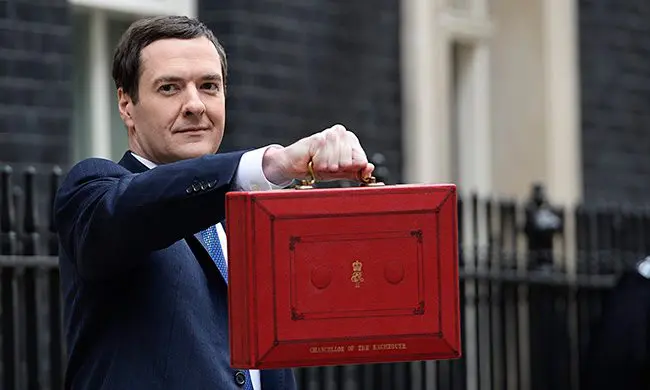In a budget which was dubbed to be one for the working people, George Osborne covered everything from taxes, maintenance grants, pensions and everything in between. With national debt levels falling and claiming to be a budget which puts economic security first, we explain how Osborne intends to ‘fix the roof whilst the sun is shining’.
The state of the economy
Having seen the Economy grow by 3 per cent in 2014, 2015 was met by a 2.4 per cent growth forecast, which was the same in march. The two following years were forecast to grow by 2.3 and 2.4 per cent. As well as this, Osborne outlined plans to create 1 million extra jobs by 2020.
Borrowing and Spending
The Chancellor was pleased to announce the rate of which the deficit was cut in the previous term was right, and the same pace will be assumed for the next term of government. Neither too fast nor too slow. Borrowing is also set to fall from £69.5bn this year to £43.1bn, £24.3bn and £6bn before hitting a £10bn surplus in 2019-20. Osborne also announced a 1 per cent public sector pay rise to continue for next four years. There will also be £37bn of further spending cuts by 2020, including £12bn of welfare cuts and £5bn from tax avoidance.
Business
The business sector will also face reforms, with permanent non-dom status to be abolished. Starting from April 2017, anyone who has lived in the UK for 15 of the past 20 years will pay same level of tax as other UK citizens. Corporation tax will also be cut to 19 per cent in 2017 and 18 per cent in 2020. Cap on charges imposed by claims management companies will be introduced and there will be an increase in insurance premium tax to 9.5 per cent in November. Tax avoidance was also on Osborne’s agenda, with £7.2bn to be raised from clampdown on tax avoidance and tax evasion with HMRC budget increased by £750m.
Extended Sunday trading
Local councils are to be given control over Sunday trading hours, which could mean that many big retailers will stay open later. The Federation of Small Businesses has warned that small firms could be adversely affected, as bigger companies soak up a greater share of consumer spend on the weekends.
John Allan, FSB national chairman, said: “The FSB remains concerned about the impact of any change to Sunday trading rules on smaller retailers. As well as assessing the potential impact of these measures, the Government should be taking a wider holistic view to see what else can be done to support these businesses.
“Bringing forward reforms to business rates is an immediate priority. We should also do more on liberalising licensing laws, easing planning restrictions and on improving customers’ access to parking. All are areas which are currently doing more to hold back the high street than Sunday trading.”
“Under current proposals, the decision to change Sunday trading rules will be devolved to the local level. It is critical these local decision makers include small businesses in the debate. Local businesses are at the heart of our communities and the ones most likely to feel the direct impact of these proposals. Their concerns should be listened to, before any decision is made.”
Small business investment
The Annual Investment Allowance allows small-to-medium-sized firms to make tax-deductible investments in equipment, plant, and machinery, encouraging businesses to invest in future productivity and growth.
The allowance is currently set at £500,000 but was due to reduce to £25,000 from January 1, 2016. Mr Osborne has set the new allowance at £200,000, which could potentially add £1bn to GDP by 2020.
Small business organisations have been calling for an increase to the £500,000 allowance, so the £200,000 will be a disappointing figure to many.
The response from Earl Yardley, director at Industrial Vision Systems, a supplier of machine vision solutions to industry, has been more pragmatic.
“The Chancellor should be applauded for fixing the annual investment allowance at £200,000,” he said. “We have already seen a significant increase in investment made in our new automated production lines and cells across the UK manufacturing base.
“By establishing a long term rate, this is sure to boost productivity and help leverage the UK at the forefront of the global manufacturing sector.”
Health and education
The NHS is the number one priority for the country according to Mr Osborne, who plans to fund an additional £8 billion by 2020, following on from the £2bn already announced. Starting from 2016-2017, students will no longer receive a maintenance grant, as this will be replaced by a loan to be paid back once they begin to earn more than £21,000 a year.
The Best of The Rest
Control over fire services, planning and children’s services will be handed to consortium of 10 councils in Greater Manchester. The Government is also set to spend 2 per cent of GDP on defence every year and introduce a £1.5bn new Joint Security fund. £30m will also be used to promote integrated transport, including use of Oyster cards, in the north of England. Fuel duty rates will be frozen, as well as new VED bands for new cars to be introduced from 2017, where 95 per cent of car owners will pay £140 a year.


